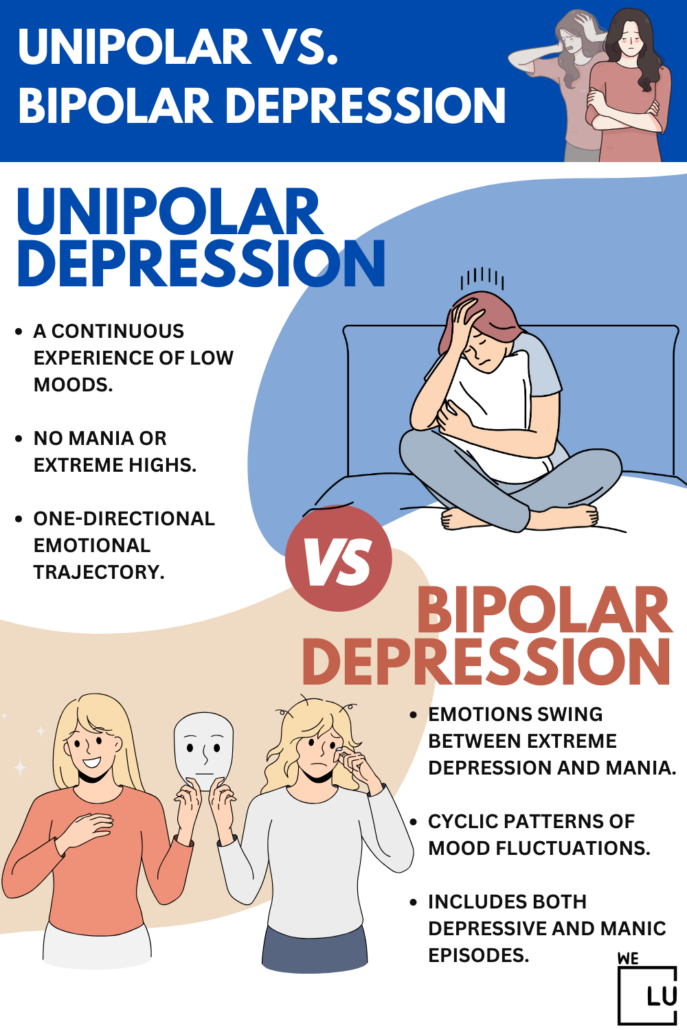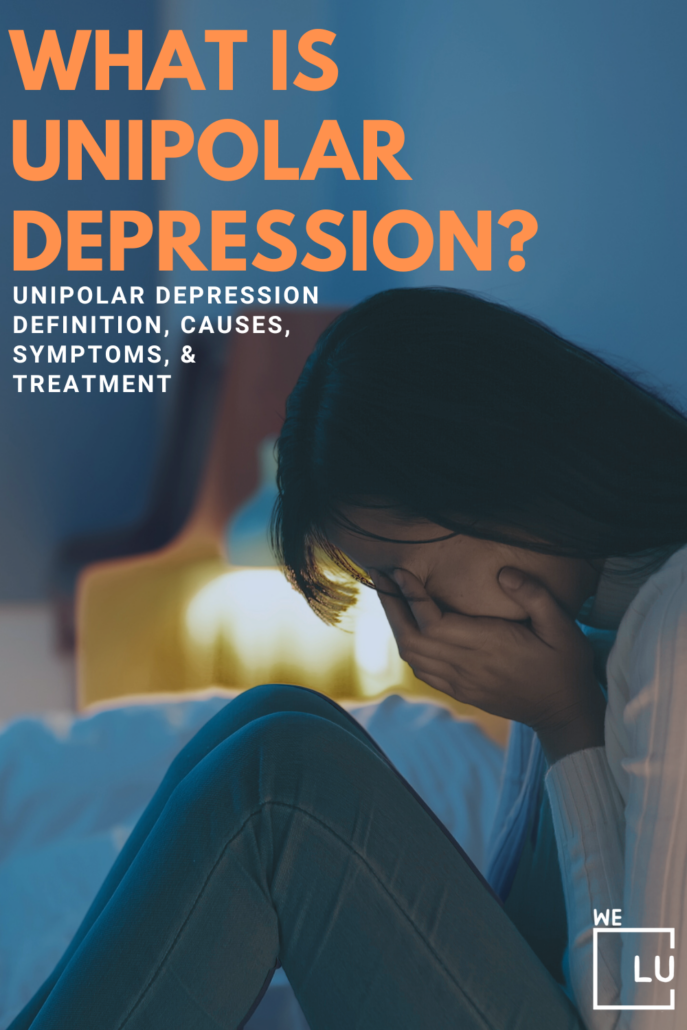What is Unipolar Depression?
Unipolar depression, also known as major depressive disorder (MDD), is characterized by persistent sadness, hopelessness, and a lack of interest or pleasure in daily activities.
Unlike bipolar disorder, individuals with unipolar depression experience depressive episodes without manic or hypomanic episodes. It can significantly impact a person’s daily functioning and often requires therapeutic interventions such as counseling or medication.
Unipolar Depression Symptoms
Unipolar depression, or major depressive disorder, is characterized by a persistent low mood and a lack of interest or pleasure in daily activities. In severe cases, thoughts of death or suicide may occur. It’s essential to seek professional help if experiencing these symptoms.
Here are common symptoms associated with unipolar depression:
- Persistent low mood.
- Loss of interest or pleasure in activities.
- Feelings of sadness, hopelessness, and worthlessness.
- Changes in sleep patterns (insomnia or hypersomnia).
- Changes in appetite or weight.
- Fatigue and low energy levels.
- Difficulty concentrating and making decisions.
- Feelings of guilt or self-blame.
- Physical symptoms such as aches and pains.
- Thoughts of death or suicide.
- Irritability or restlessness.
Experiencing several of these symptoms for an extended period may indicate the presence of unipolar depression, and seeking professional help is crucial for proper diagnosis and treatment.
What Causes Unipolar Depression?
Unipolar depression is often caused by a combination of biological, genetic, environmental, and psychological factors.
It can result from an imbalance of neurotransmitters in the brain, genetic predisposition, or a history of traumatic experiences. Stressful life events, such as loss or significant changes, can trigger depression in susceptible individuals.
Moreover, personality traits and coping mechanisms play a role. In simpler terms, it’s like a puzzle where genes, brain chemistry, life experiences, and how we handle stress all contribute to the picture of unipolar depression.
How is Unipolar Depression Treated?
Unipolar depression is often treated with a combination of talking therapy and medication. Cognitive-behavioral therapy (CBT) is a standard counseling method focusing on changing negative thoughts and behaviors linked to depression. It helps build better coping strategies and stress management skills. Interpersonal therapy (IPT) is another therapy form that targets relationships and social skills, aiming to enhance communication and support networks.
Medication, like antidepressants, is often prescribed to address imbalances in brain neurotransmitters and ease depressive symptoms. Common types include SSRIs and SNRIs.
Treatment choice depends on the severity of symptoms, how an individual responds, and possible side effects. Collaborating closely with mental health professionals allows for a tailored treatment plan, with regular check-ins and adjustments to ensure effectiveness.
What Makes Unipolar Depression Different From Other Types of Depression?
Unipolar depression is unique because it typically involves a continuous experience of low moods without the highs of mania seen in bipolar depression. Unlike bipolar conditions, where emotions swing between extreme depression and mania, unipolar depression follows a more consistent and one-directional path.
This straightforward emotional trajectory sets it apart, lacking the cyclic patterns found in other conditions like bipolar disorder. The absence of significant shifts into elevated mood states defines unipolar depression and influences how it’s diagnosed and treated compared to other forms of depression.
Who Can Give a Unipolar Depression Diagnosis?
Mental health professionals, including the following, typically make a diagnosis of unipolar depression:
- Psychiatrists: Medical doctors specializing in mental health who can prescribe medication.
- Psychologists: Trained professionals who use various therapeutic approaches for assessment and treatment.
- Licensed Clinical Social Workers (LCSWs): Trained in social work focusing on mental health.
- Primary Care Physicians: In some cases, general practitioners may diagnose and initiate treatment for depression.
Consult with a qualified professional for an accurate diagnosis. They will assess symptoms, consider medical history, and may use standardized tools to determine the presence of unipolar depression. Seeking help from a mental health professional ensures appropriate care and treatment options.
Different Types of Depression
Here’s a list of different types of depression:
- Unipolar Depression (Major Depressive Disorder): Persistent low mood without manic episodes.
- Bipolar Disorder: Involves both depressive and manic episodes.
- Persistent Depressive Disorder (Dysthymia): Chronic low-grade depression lasting for at least two years.
- Seasonal Affective Disorder (SAD): Depression that occurs at a specific time of year, often in winter.
- Postpartum Depression: Occurs after childbirth, affecting mothers.
- Psychotic Depression: Combines severe depression with psychosis (loss of touch with reality).
- Premenstrual Dysphoric Disorder (PMDD): Severe depression and irritability before menstruation.
- Situational Depression: Caused by specific stressors or life events.
Seek professional help for an accurate diagnosis and appropriate treatment.


Skip To:
Learn More:
- Bipolar Disorder Symptoms, Causes, Diagnosis, and Treatment
- What is Mild Depression? Symptoms and Treatment
- What is Crippling Depression? Learning How To Deal With Crippling Depression
- Atypical Depression. What Is It? Symptoms and Treatment
- Learn How to Cope with Depression. 10 Ways to Cope with Depression.
- Manic Depression Vs Bipolar. Are They The Same?
- Situational Depression Vs Clinical Depression, Symptoms, Causes, and Treatment
- What Does Depression Feel Like? Symptoms and Early Signs
- Signs Of Depression In Women, Symptoms and Treatment
- Effective Depression Treatment, Depressive Disorder Symptoms, Types, and Causes
Am I Depressed? Free Quiz
Many people experience depression, and it can affect how you handle everyday things, such as work and relationships. Are you worried if you’re experiencing depression now? Take the quiz below to explore if you may be experiencing symptoms associated with depression.
This quiz is not a substitute for professional diagnosis, so seek guidance from a mental health professional for an accurate assessment.
Get unipolar depression counseling that works. Discover professional help from We Level Up Florida’s mental health therapists. Start getting support with a free call to our mental health hotline.
Get Help. Get Better. Get Your Life Back.
Searching for Accredited Dual Diagnosis Mental Health Centers Near You?
Even if therapy failed previously, or are in the middle of a difficult crisis, we stand ready to support you. Our trusted behavioral health specialists will not give up on you. When you feel ready or just want someone to speak to about counseling alternatives to change your life call us. Even if we cannot assist you, we will lead you to wherever you can get support. There is no obligation. Call our hotline today.
FREE 24/7 Dual Diagnosis Mental Health Services HotlineHow to Cope With Unipolar Depression?
To manage unipolar depression, make positive changes like sticking to a routine, doing things that make you happy, and reaching out for support from friends or professionals. These steps are crucial for effectively dealing with and navigating through unipolar depression.
Coping with unipolar depression involves two main things.
- First, it helps to have a routine, like a regular schedule for waking up, eating, and exercising. This routine gives a sense of stability during low moods. Doing activities that bring joy or a sense of accomplishment, even small ones, can also make the air better.
- Second, having a supportive network is essential. Talking to friends, family, or a mental health professional about what you’re going through can make you feel less alone. It’s like building a reliable support system where you can share your feelings and get understanding and encouragement.
In therapy, you might work on changing negative thoughts and finding healthier ways to cope. Mindfulness and relaxation techniques can also help manage stress and boost emotional well-being. The key is to find what works best for you and create a well-rounded approach to mental health.

Other Effective Strategies to Deal With Unipolar Depression
- Establish a Routine: Create a daily schedule for stability.
- Engage in Joyful Activities: Include small activities that bring happiness.
- Build a Support System: Talk to friends, family, or a therapist for understanding.
- Challenge Negative Thoughts: Work on changing unhelpful thought patterns.
- Mindfulness and Relaxation: Practice techniques to manage stress.
- Physical Exercise: Incorporate regular physical activity into your routine.
- Healthy Sleep Habits: Ensure a consistent and sufficient sleep schedule.
- Set Realistic Goals: Break tasks into manageable steps to avoid feeling overwhelmed.
- Express Yourself Creatively: Art, writing, or other creative outlets can be therapeutic.
- Limit Stressors: Identify and minimize sources of stress in your life.
Unipolar Depression Treatment
Unipolar depression treatment includes a range of approaches aimed at relieving the persistent and distressing symptoms associated with major depressive disorder. One primary avenue of treatment is psychotherapy, with cognitive-behavioral therapy (CBT) being a widely utilized and effective method to address negative thought patterns.
Medications, particularly antidepressants, are often prescribed to rebalance neurotransmitters in the brain and alleviate symptoms. Also, lifestyle changes, social support, and self-care strategies play integral roles in creating a holistic and individualized approach to managing and overcoming unipolar depression.
Psychotherapy for Unipolar Depression
While Cognitive-Behavioral Therapy (CBT) stands out as a widely used therapy for depression, several other evidence-based approaches exist. These therapies, grounded in research, offer diverse strategies to address and alleviate depressive symptoms effectively.
- Cognitive Behavioral Therapy (CBT): Focuses on identifying and changing negative thought patterns and behaviors contributing to depression.
- Interpersonal Therapy (IPT): Addresses interpersonal issues and relationships to improve communication and resolve conflicts, which may be contributing to depressive symptoms.
- Psychodynamic Therapy: Explores unconscious patterns and unresolved conflicts that may be influencing current depressive experiences.
- Behavioral Activation (B.A.): Focuses on increasing engagement in positive activities to counteract the withdrawal and inactivity often associated with depression.
- Mindfulness-Based Cognitive Therapy (MBCT): Integrates mindfulness techniques with cognitive therapy to prevent the recurrence of depressive episodes.
- Dialectical Behavior Therapy (DBT): Combines cognitive-behavioral techniques with mindfulness to address emotional dysregulation often present in depression.
- Problem-Solving Therapy (PST): Aims to enhance coping skills and problem-solving abilities to manage stressors contributing to depression.
- Acceptance and Commitment Therapy (ACT): Encourages acceptance of emotions and values-based action to promote psychological flexibility.
- Grief Counseling: Specifically addresses the impact of loss and helps individuals navigate the grieving process.
- Schema Therapy: Targets long-standing, maladaptive patterns developed during childhood that contribute to depression.
We Level Up FL Mental Health Center Tips for Unipolar Depression
To feel better with unipolar depression, make a daily routine, do things that make you happy, and talk to friends or professionals for support. Small, positive changes in your everyday life can make a big difference, and reaching out for help is an essential step in managing and overcoming depression.